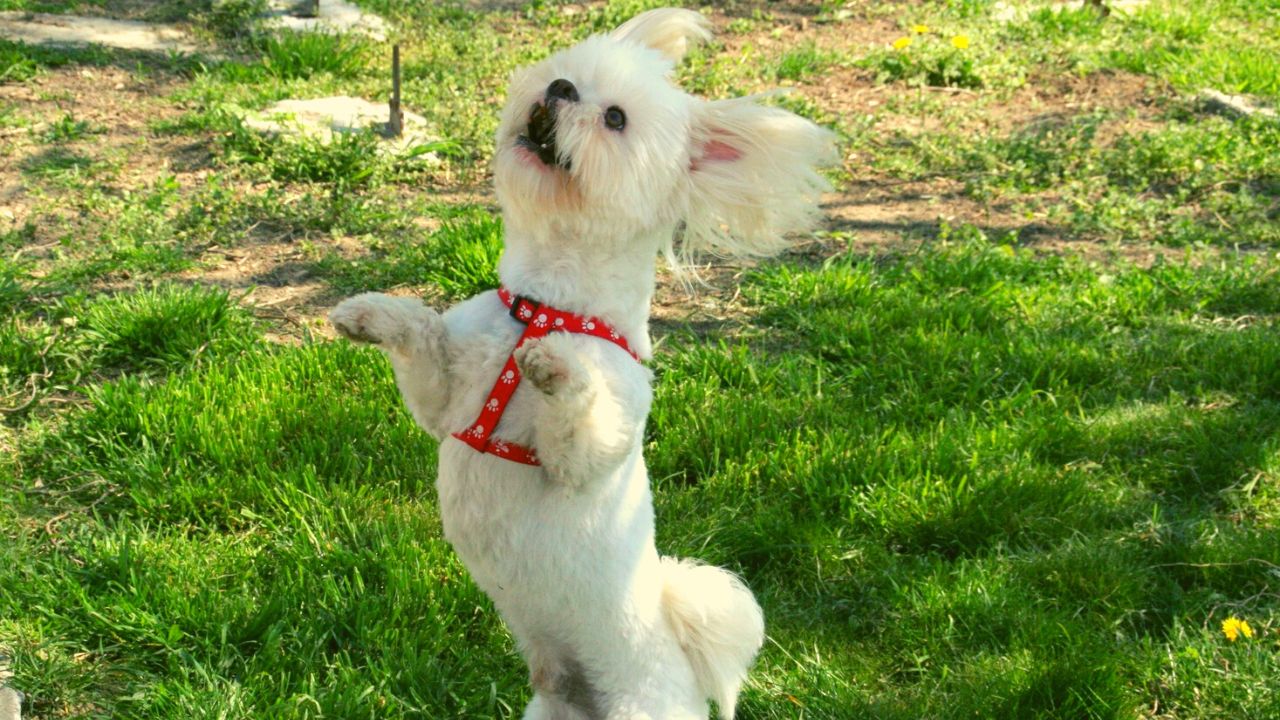
Table of Contents
The Blue Merle French Bulldog is a rare and unique variation of the famous French Bulldog breed. With its striking coat colouration and distinct physical features, the Blue Merle French Bulldog has quickly become a popular dog breed among dog enthusiasts in recent years. However, these dogs often have a hefty price tag due to their rarity and high demand. Despite the cost, many people are willing to pay for the chance to own one of these beautiful and beloved dogs. This article will explore the characteristics, care, and considerations of owning a Blue Merle French Bulldog.
History Of Blue Merle French Bulldog
The Blue Merle French Bulldog is a relatively new addition to the French Bulldog breed. While the French Bulldog has been around since the 1800s, the Blue Merle variation only became popular more recently. The origins of the Blue Merle French Bulldog need to be better documented. Still, it is believed that the breed originated in France and likely resulted from breeding different types of Bulldogs with local terrier breeds.
The Blue Merle coat colouration is caused by a genetic mutation that affects pigment production in the dog’s fur. This results in a marbled, blue-grey appearance with black spots or patches. Despite its recent popularity, the Blue Merle French Bulldog is not recognized by major kennel clubs such as the AKC or the UKC.
However, the breed is recognized by smaller, more specialized clubs that cater specifically to French Bulldogs. While the Blue Merle French Bulldog may come with a hefty price tag, its unique appearance and loving temperament have made it a highly sought-after breed for many dog lovers.
Appearance and Physical Characteristics
The Blue Merle French Bulldog is a small, compact breed known for its distinctive coat colouration and charming personality. These dogs typically weigh 16-28 pounds and stand between 11-12 inches tall at the shoulder. They have a sturdy and muscular build, with a short, smooth coat that is dense and glossy. One of the most notable physical characteristics of the Blue Merle French Bulldog is its unique coat colouration, which features a marbled blue-grey appearance with black spots or patches.
In addition to their distinctive coat, Blue Merle French Bulldogs have various physical features that set them apart from other breeds. They have a broad, flat head, short snouts, and large, expressive blue eyes. Their ears are typically bat-like and stand erect, adding to their adorable appearance. Despite their small size, Blue Merle French Bulldogs have a solid and muscular build, with broad shoulders and a sturdy frame. The Blue Merle French Bulldog is a charming and unique breed with a distinct appearance and lovable personality.
Coat Color Variations and Markings
The Blue Merle French Bulldog is a rare and distinctive breed known for its unique coat colouration. This breed’s coat is characterized by a marbled blue-grey appearance with black spots or patches caused by a genetic mutation that affects pigment production in the fur. While the Blue Merle coat colouration is this breed’s most recognizable feature, other colour variations and markings may appear in some Blue Merle French Bulldogs.
One common variation is the Blue Merle Pied, which features a blue-grey base coat with white markings on the chest, feet, and muzzle. Another variation is the Blue Merle Brindle, which has a blue-grey base coat with black stripes or brindle markings. Some Blue Merle French Bulldogs may also have a solid blue coat without black spots or markings.
It’s important to note that while these variations and markings may be present in some Blue Merle French Bulldogs, they are not as common as the classic blue-grey marbled coat with black spots or patches. Regardless of their specific coat colouration, Blue Merle French Bulldogs are a unique and highly sought-after breed with a loyal and loving personality.
Genetics
The genetics of Blue Merle French Bulldogs are complex and involve several genes. One of the primary genes responsible for this colouration is the Merle gene, which regulates pigment distribution in the dog’s coat. Dogs with two copies of the Merle gene (one from each parent) will have a more pronounced Merle pattern, while those with only one copy may have a less defined pattern. However, breeding two Merle French Bulldogs together can lead to health problems in their offspring, including hearing and vision issues, so responsible breeders will typically avoid these pairings. Prospective owners need to research and choose a reputable breeder who prioritizes the health and well-being of their dogs.
Temperament and Personality
Blue Merle French Bulldogs are known for their charming and playful personalities, making them excellent family pets. These dogs are friendly, affectionate, and sociable and enjoy spending time with their owners. They are known for their loyalty and love to be around people, making them great companions for families with children or seniors looking for furry friends to keep them company. Blue Merle French Bulldogs are also known for their adaptability and can thrive in different living environments, whether it’s a small apartment or a larger house with a yard.
Despite their small size, Blue Merle French Bulldogs have prominent personalities and are known to be quite spirited and energetic. They love playing and can be active but enjoy relaxing and snuggling up with their owners. They are intelligent dogs and can be trained easily, making them an excellent choice for first-time dog owners. Blue Merle French Bulldogs are known for their sense of humour and can be pretty entertaining with their playful antics. These dogs have lovable and charming personalities, making them a popular breed among dog lovers.
Exercise and Training Requirements
Blue Merle French Bulldogs are a small breed that doesn’t require a lot of exercise, but they need daily physical activity to stay healthy and happy. A daily walk or playtime in the yard can help them burn off energy and maintain weight. These dogs enjoy playing fetch, tug-of-war, and other interactive games, which can also help stimulate their minds and prevent boredom. It’s important not to over-exercise them, especially in hot weather, as they can quickly overheat due to their short snouts and respiratory issues.
Training Blue Merle French Bulldogs is usually easy as they are intelligent dogs and love to please their owners. Early socialization and obedience training can help them become well-behaved and well-adjusted dogs. Positive reinforcement techniques, such as treats and praise, work well with this breed. Keeping training sessions short and fun is essential to keep them engaged and interested. These dogs are sometimes known to be stubborn, so consistency and patience are essential in training. With proper exercise and training, Blue Merle French Bulldogs can make wonderful and obedient companions for their owners.
Exercise and Training Requirements
Blue Merle Australian Shepherds are an active breed that requires daily exercise to keep them healthy and happy. These dogs have a high energy level and enjoy physical activity, such as running, hiking, and playing fetch. They thrive in an environment with plenty of space to run and play, such as a large backyard or a farm. It is essential to provide them with enough exercise to prevent destructive behaviours, such as chewing and digging.
Training Blue Merle Australian Shepherds is essential to ensure they are well-behaved and obedient. These dogs are brilliant and love to learn new things, making training a fun and rewarding experience for both the dog and the owner. Positive reinforcement training, such as treats and praise, works well with this breed. It’s important to start training them early to prevent bad habits from forming. Socialization is also essential to prevent aggression towards other animals and humans. With consistent training and exercise, Blue Merle Australian Shepherds can become well-behaved and loyal companions for their owners.
Grooming and Maintenance
Grooming and maintenance of Blue Merle French Bulldogs are relatively straightforward. These dogs have short, smooth coats that don’t require a lot of brushing or grooming. Weekly brushing with a soft-bristled or rubber curry brush can help remove loose hair and distribute natural oils throughout their coat. They should also have their ears checked and cleaned regularly to prevent infections.
Blue Merle French Bulldogs are prone to skin allergies and infections, so keeping them clean and dry is essential. Bathing them every few months or as needed with a mild dog shampoo can help keep their skin and coat healthy. Trimming their nails regularly is essential, as overgrown nails can cause discomfort and difficulty walking. Dental hygiene is also essential; owners should brush their dog’s teeth regularly to prevent dental problems. With regular maintenance, Blue Merle French Bulldogs can easily be groomed and maintained, allowing them to look and feel their best.
Diet and Nutrition Requirements
Diet and nutrition are essential aspects of maintaining the health of Blue Merle French Bulldogs. These dogs tend to gain weight, so feeding them a balanced diet that meets their nutritional needs without overfeeding them is essential. High-quality dog food formulated for their breed and age can give them the nutrients they need to maintain their health. Owners should avoid feeding their Blue Merle French Bulldogs table scraps and human food, as these can be high in calories and lead to weight gain.
Blue Merle French Bulldogs are prone to specific health issues, such as allergies, skin problems, and digestive issues. Feeding them a protein-rich diet free from common allergens like grains and dairy can help prevent these health problems. Owners should also ensure that their dogs have access to fresh water, as dehydration can lead to health problems. With a healthy and balanced diet, Blue Merle French Bulldogs can maintain their health and enjoy a long and happy life with their owners.
Suitability of Blue Merle French Bulldogs as Family Pets
Blue Merle French Bulldogs are a popular breed for families, as they are affectionate and loyal companions. They are known for their playful and fun-loving personalities, which make them great playmates for children. They are also adaptable to different living situations, as they can be comfortable in apartments or larger homes with yards. These dogs are easy to train and don’t require a lot of exercise, making them a good choice for families who lead busy lifestyles.
However, Blue Merle French Bulldogs can be prone to specific health issues, such as respiratory problems and skin allergies, which require regular veterinary care. They also tend to gain weight, so monitoring their diet and exercise is essential to prevent obesity. Blue Merle French Bulldogs can make wonderful family pets if given proper care and attention. With their affectionate and playful personalities, they can bring joy and happiness to any home.
How to Find and Choose a Blue Merle French Bulldog
If you’re interested in finding and choosing a Blue Merle French Bulldog, there are a few things you should consider. First, finding a reputable breeder who can provide you with a healthy and well-socialized puppy is essential. Look for a breeder knowledgeable about the breed who conducts health screenings on their dogs to ensure they are free from genetic disorders. You can also consider adopting a Blue Merle French Bulldog from a rescue organization, which can be a great way to give a loving home to a needy dog.
When choosing a Blue Merle French Bulldog, it’s essential to consider their temperament and personality. Look for a puppy who is friendly, outgoing, and interacts well with people and other dogs. It would help if you also considered the puppy’s health and physical characteristics, such as coat colour and body structure. Remember, a Blue Merle French Bulldog is a lifetime commitment, so choosing a dog is the right fit for your lifestyle and family is essential. You can find the perfect Blue Merle French Bulldog with careful consideration and research.
FAQs
What is a Blue Merle French Bulldog?
A Blue Merle French Bulldog is a unique variation of the French Bulldog breed, characterized by a marbled coat with a mix of grey, black, and white fur. They are known for their playful personalities and make great family pets.
Are Blue Merle French Bulldogs prone to health problems?
Like all purebred dogs, Blue Merle French Bulldogs are prone to specific health issues, such as respiratory problems and skin allergies. It’s essential to provide them with proper care and regular veterinary check-ups to ensure they stay healthy.
Are Blue Merle French Bulldogs easy to train?
Blue Merle French Bulldogs are generally easy to train, as they are intelligent and eager to please. Consistent and positive training methods can help them learn basic commands and behaviour quickly.
Do Blue Merle French Bulldogs require a lot of exercise?
Blue Merle French Bulldogs don’t require a lot of exercise and are generally content with short walks and playtime indoors. However, regular exercise is essential to prevent obesity and maintain overall health.
How can I find a reputable Blue Merle French Bulldog breeder?
To find a reputable breeder, do your research and look for breeders who conduct health screenings on their dogs and prioritize the welfare of their puppies. You can also consider adopting a Blue Merle French Bulldog from a rescue organization.
Conclusion
In conclusion, Blue Merle French Bulldogs are a unique and beloved breed known for their playful personalities and striking appearance. With proper care and attention, they can make wonderful family pets. It’s essential to do your research and choose a reputable breeder or rescue organization to ensure you bring home a healthy and happy dog.

Aiden Paul
Aiden is a pet expert who currently writes for Animalia Planet






One Comment